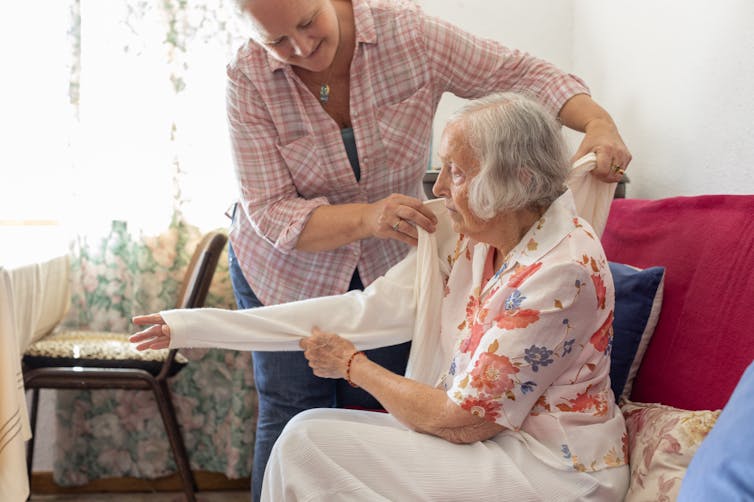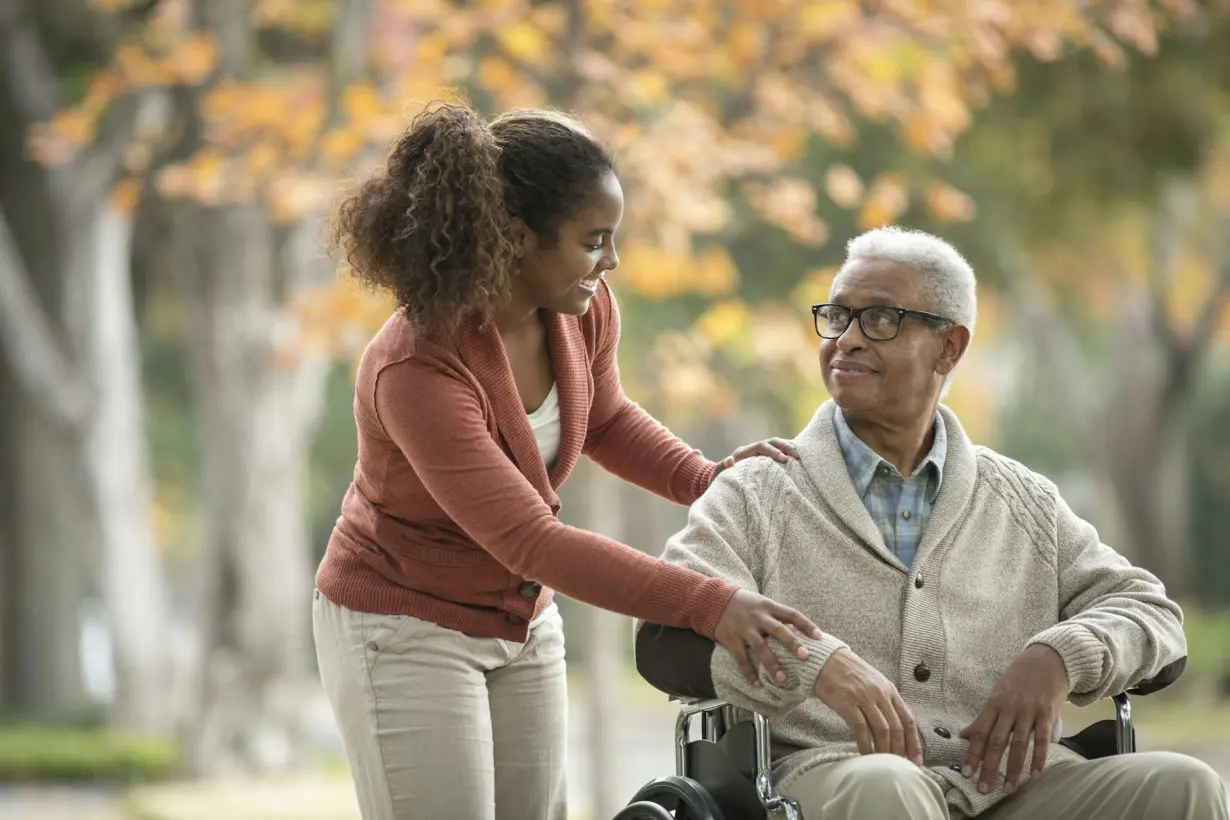Millions of Americans have become informal family caregivers: people who provide family members or friends with unpaid assistance in accomplishing daily tasks such as bathing, eating, transportation and managing medications.
Driven in part by a preference for home-based care rather than long-term care options such as assisted living facilities, and the limited availability and high cost of formal care services, family caregivers play a pivotal role in the safety and well-being of their loved ones.
Approximately 34.2 million people in the United States provide unpaid assistance to adults age 50 or above, according to the Family Caregiver Alliance. Among them, about 15.7 million adult family caregivers care for someone with dementia.
I am a licensed clinical social worker and an assistant professor of social work studying disparities in health and health care systems. I focus on underrepresented populations in the field of aging.
Challenges for family caregivers
In my research focusing on East Asian family caregivers for people with Alzheimer’s and related dementia, I discovered that Chinese American and Korean American caregivers often encounter challenging situations. These include discrimination from health care facilities or providers, feelings of loneliness and financial issues. Some of these caregivers even find themselves having to retire early because they struggle to balance both work and caregiving responsibilities.
My findings join a growing body of research showing that family caregivers commonly encounter five specific challenges: financial burdens, limited use of home- and community-based services, difficulties accessing resources, a lack of knowledge about existing educational programs, and physical and emotional challenges, such as feelings of helplessness and caregiver burnout.
However, researchers are also finding that family caregivers feel more capable of managing these challenges when they can tap into formal services that offer practical guidance and insights for their situations, as well as assistance with some unique challenges involved with family caregiving.
The demographics of informal caregivers
More than 6 in 10 family caregivers are women.
Society has always expected women to take on caregiving responsibilities. Women also usually earn less money or rely on other family members for financial support. This is because equal pay in the workplace has been slow to happen, and women often take on roles like becoming the primary caregiver for their own children as well as their aging relatives, which can drastically affect their earnings.
While nearly half of care recipients live in their own homes, 1 in 3 live with their caregivers.
Sometimes termed “resident caregivers,” these individuals are less likely to turn to others outside the family for caregiving support, often because they feel that it’s important to keep caregiving within the family. These caregivers are typically older, retired or unemployed and have lower income than caregivers who live separately.
According to a 2020 report from the AARP Public Policy Institute, about 1 in 3 family caregivers provide more than 21 hours of care a week to a loved one.
Juggling caregiving with everyday life
Caregiving often creates financial burdens because it makes it harder to hold a full-time or part-time job, or to return to work after taking time off, particularly for spouses who are caregivers.
Often, community-based organizations such as nonprofits that serve older adults offer a variety of in-home services and educational programs. These can help family caregivers manage or reduce the physical and emotional strains of their responsibilities. However, these demands also can make it difficult for some caregivers to even learn that these resources exist, or take advantage of them, particularly as the care recipient’s condition progresses.
These challenges worsened at the height of the COVID-19 pandemic. Many support programs were canceled, and it was hard to access health care, which made things even more stressful and tiring for caregivers.
Research shows that those who are new to family caregiving often take care of their loved ones without any formal support initially. As a result, they may face increased emotional burdens. And caregivers age 70 and above face particular challenges, since they may be navigating their own health issues at the same time. These individuals are less likely to receive informal support, which can lead to social isolation and burnout.

Support for family caregivers
There are numerous programs and services available for family caregivers and their loved ones, whether they reside at home or in a residential facility. These resources include government health and disability programs, legal assistance and disease-specific organizations, some of which are specific to certain states.
In addition, research has found that providing appropriate education and training to people in the early stages of caregiving enables them to better balance their own health and well-being with successfully fulfilling their responsibilities. Many community-based organizations, such as local nonprofits focused on aging, as well as government programs or senior centers, may offer case management services for older adults, which can be beneficial for learning about existing resources and services.
For family caregivers of people with dementia, formal support services are particularly crucial to their ability to cope and navigate the challenges they face.
The role of Medicaid
Formal support may also be helpful in finding affordable home-based and community resources that can help compensate for a lack of informal support. These include home health services funded by Medicare and Medicaid-funded providers of medical and nonmedical services, including transportation.
Medicaid, which targets low-income Americans, seniors, people with disabilities and a few select other groups, has certain income requirements. Determine the eligibility requirements first to find out whether your loved one qualifies for Medicaid.
The services and support covered by Medicaid may vary based on a number of factors, such as timing of care, the specific needs of caregivers and their loved ones, the care plan in place for the loved one and the location or state in which the caregiver and their loved one reside.
Each state also has its own Medicaid program with unique rules, regulations and eligibility criteria. This can result in variations in the types of services covered, the extent of coverage and the specific requirements for accessing Medicaid-funded support.
If so, contact your state’s Medicaid office to get more information about self-directed services and whether you can become a paid family caregiver.
Medicare might help
Medicare may help pay for certain home health services if an older adult needs skilled services part time and is considered homebound.
This assistance can alleviate some of the caregiving responsibilities and financial burdens on the family caregiver, allowing them to focus on providing care and support to their loved ones without worrying about the cost of essential medical services.
Peer-to-peer support is also crucial. Family caregivers who join support groups tend to manage their stress more effectively and experience an overall better quality of life.

Kathy Lee has received funding from the Alzheimer's Association - New to the Field (AARG-NTF-20-678171).
Source: The Conversation



 Family caregivers may be less likely to turn to others when they need their own support.
Family caregivers may be less likely to turn to others when they need their own support.